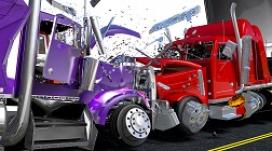Calculating the Aftermath of Truck Crashes
When a government agency proposes a new regulation, that agency must explain the impacts of the proposal with a detailed benefit and cost analysis.
To help inform Federal Motor Carrier Safety Administration (FMCSA) regulations aimed at reducing truck-involved crashes, deaths, and injuries, economists and environmental scientists at Volpe developed sophisticated data models that accurately show the range of consequences from an average truck crash.
The Challenge
The costs of a truck crash are not always as obvious as a broken leg or a crushed bumper. After an accident, drivers get stuck in stop-and-go traffic or they seek alternate routes; both scenarios increase emissions and pollution. An average accident involving a truck leads to 3.2 tons of CO2 emissions due to detours and delays, with nearly 11 tons of CO2 emitted for an accident on an urban expressway.
FMCSA needs accurate projections of the environmental and financial savings from avoided crashes in order to justify new regulations—but previous data models on the costs of truck-involved crashes did not fully capture the complicated consequences of a truck crash.
The Solution
The Volpe team analyzed public data on fatal accidents, reported crashes, and detailed traffic counts down to 15-minute intervals for a variety of roadways. Samples were taken from multiple times of day, on different days of the week, in different states, and from different vehicle classes.
Researchers simulated traffic flow and emissions releases following typical truck-involved accidents to improve the quality of data on crash cost estimates. The Volpe team also modeled the unique environmental challenges that come from trucks hauling hazardous materials and assessed the effects that a truck-involved crash can have on property damage, spilled fuel, and work productivity lost from detours and delays.
The Impact
Volpe’s year-and-a-half-long research, released in March 2013, gives FMCSA the confidence to zero in on policies, regulations, and enforcements that can reduce the most costly crashes and eliminate the environmental and financial impacts of crashes that never happen. Volpe’s work gives FMCSA a robust and accurate data model that provides a more complete picture of the effects of truck and bus crashes.
Customer

Federal Motor Carrier Safety Administration
